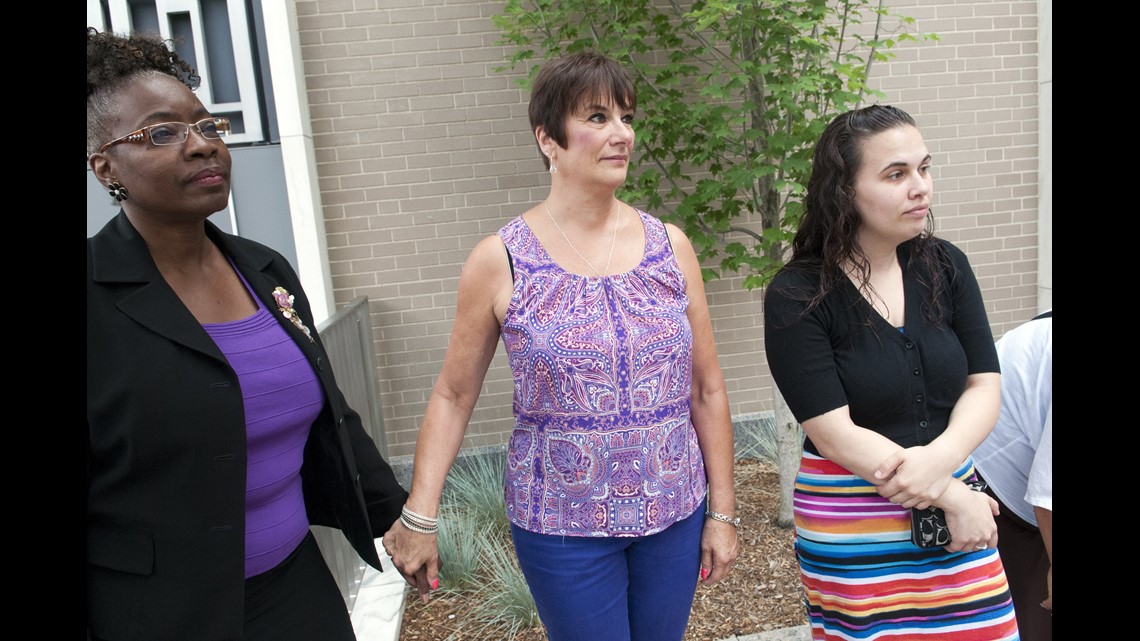

HARTFORD – It took a federal judge less than two hours Wednesday to rule that a Stratford grandmother had no grounds to argue that her civil rights were violated when she was arrested for sending her grandchildren to school in Stratford even though their mother lived in Milford.
U.S. District Judge Michael P. Shea effectively dismissed the case shortly before noon.
Josephine S. Miller, the lawyer for Marie Menard, said she will consider whether to appeal the case in the U.S. Court of Appeals for the Second Circuit.
“There is a strong, strong strong bias in favor of institutional parties,” Miller said.
Miller contended that the Stratford school district violated Menard’s right to “equal protection” because she was singled out for arrest while the district did not arrest others in the same situation. “Both she and her daughter were singled out for treatment that no one else in the Stratford district has ever been subject to,” Miller said.
Menard sought “compensatory and punitive damages, as well as attorney’s fees and costs.”
As a result of her arrest and prosecution, Menard had to pay $19,500 to the district along with $7,500 in legal fees. Menard’s grandsons attended Stratford schools most recently in the school year 2009-10. Menard and Wade were arrested in October 2010 and charged with first-degree larceny.
Miller said that Menard and her daughter, Ana Wade, also suffered emotional damage. “You can imagine,” said Miller of Menard. “She’s not a criminal. She’s never been arrested, fingerprinted, had a mug shot — the whole deal.”
Under the new state law signed by Gov. Dannel P. Malloy on June 24 — and effective Oct. 1 — Menard never would have been arrested, Morris said.
By decriminalizing the offense, the law assures that Connecticut residents who improperly enroll children in districts where they do not live will no longer be subject to larceny charges.
State Rep. Bruce V. Morris, D-Norwalk, a strong proponent of the new law, said: “Mrs. Menard’s case is a perfect example of why the law that we passed is so important. … A grandmother who ends up being arrested. … She ended up plea bargaining down to avoid jail time. She had to use her accelerated rehabilitation.”
Now, Morris said, school districts will have to rely on an administrative remedy that has always been in place. That route allows residents who are found to violate school residency requirements to go to the district’s board of education for a hearing by an impartial officer. If a violation is confirmed, Morris said, a school district can assess the family for the costs.
If they are turned down by a hearing officer, Morris said, residents can go on to appeal to the State Board of Education.
In most cases, Morris said, districts pursue the administrative remedy.
But in Menard’s case, he said, the Stratford district went straight for the criminal charges, rather than pursuing the administrative remedy first.
In 2011, a Bridgeport woman, Tanya McDowell, made national headlines when she was arrested and accused of illegally enrolling her child in kindergarten in Norwalk, using a baby sitter’s home address. Her case prompted much debate by lawmakers and led to the change in the state’s law.
Shortly before the court session began Wednesday morning, a group campaigning against so-called “education by zip code” held a press conference on the courthouse steps.
“We have a proud grandmother. She was arrested for stealing a public education,” said Gwendolyn Samuel, founder of the Connecticut Parents Union, adding for emphasis, “arrested for stealing a public education.”
The group brought in a mother from Ohio and a father from Pennsylvania who have also been arrested for improperly sending children to an out-of-district school. Samuel has said her organization hopes more states adopt a law similar to the one just passed in Connecticut to decriminalize the offense.
Morris also appeared at the press conference, saying that under the former Connecticut law, “people were selectively criminalized” for improperly enrolling a child in a school, charged “with a crime equivalent to bank robbery for trying to get a child an education.”
”Education by zip code — that is the true violation of our constitution,” he said.
Story by Kathy Megan, Hartford Courant
